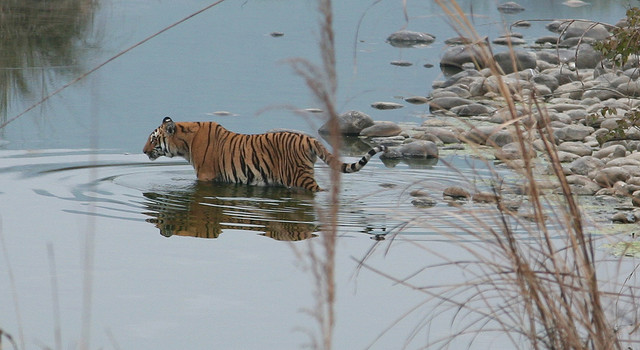
Dehra Dun: For those who have helped the setting up of resorts and other infrastructure in the buffer areas of the Corbett National Park in Uttarakhand and are now batting for allowing tourism in these areas, there is something to take note of.
The number of tigers in the park cannot go up because of space considerations.
According to research undertaken by the Indian Wildlife Institute here the number of felines in the Park is the maximum that the park area can sustain. Tigers are territorial animals and they have a territory marked for themselves. Any interference can result in fierce territorial fights that cause severe injury to one of the felines.
In the research work that has been undertaken during six long years, it has been said that should the tiger population in the Park increase, it will force the felines into the suburbs or areas outside the Park. This will only increase the man-animal conflict which has already reached serious levels in various areas adjoining forests in Uttarakhand.
The study indicates that the number of felines has reached its peak and as of now a feline will have about seven sq. kms. of territory to itself. This is despite the fact that the concentration of tigers is the maximum in the Corbett National Park as compared to other tiger reserves in the country, where felines have more territorial areas to them.
It was observed that should the tiger population increase further, the felines will be forced to move to adjoining forests where there is a lot of human movement and interference, which could aggravate the man-animal conflict. Besides, any increase will also have a bearing on the feed for the felines, as the number of herbivores in the Park is just about enough to cater to the present strength.
It is disheartening to note that there may not be an increase in the number of felines in Corbett, but the Panna Tiger Reserve has shown encouraging results. In 2008, there were no tigers in the Reserve following which the Madhya Pradesh translocated four females and one male into the reserve from different tiger reservee. Today their numbers have gone up to 18, which includes 13 cubs.
A journalist with over 40 years of experience, Jagdish Bhatt was Editor, Hill Post (Uttarakhand).
Jagdish had worked with India’s leading English dailies, which include Times of India, Indian Express, Pioneer and several other reputed publications. A highly acclaimed journalist, he was a recipient of many awards
Jagdish Bhatt, aged 72, breathed his last on 28th August 2021 at his Dehradun residence.




Government should take necessary step to solve this problem. Because this will give a lot of fun to tourists and will also helpful for national tourism.